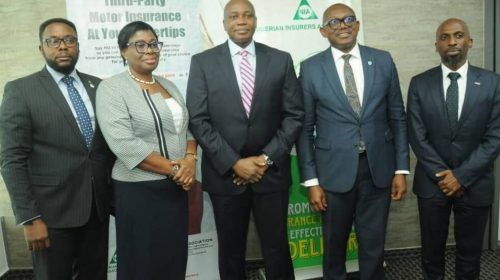Economy Rebasing: Insurance Sector Struggles for Relevance
The recent rebasing of the nation’s economy which placed Nigeria as the first largest economy in the Africa and 26th in the world, has indeed placed more responsibilities on the insurance sector.
This is true as the rebasing has further dragged down the sector’s contribution to Gross Domestic Product (GDP) from 0.7 to 0.6, a development that has become a source of worry for both the regulators, operators and other relevant stakeholders.
The National Insurance Commission (NAICOM), the sector’s major regulatory body, admitted this as it noted that the development called for strategies in the areas of claims settlement and product development.
“When the rebasing was announced , I quickly went and checked our position, and found out that following that, we are going nowhere, so we quickly go back to the drawing board to draw strategies that will position us to ensure that we make significant impact”, said the commissioner for insurance, Mr Fola Daniel.
Growth Strategies
According to Daniel, the commission would consolidate on the gains made so far in compulsory insurance, ensure proper implementation of the compulsory insurance products, grow the market in order to make meaningful contribution to GDP.
Operators on their part, noted that making insurance relevant to those sectors that have made meaningful contribution to GDP and other areas the sector is yet to penetrate will surely help.
The Director General, Nigeria Insurers Association (NIA), Mr. Thomas Sunday, speaking on the issue said: “We should leverage on those that have contributed to the GDP to take maximum advantage of them to shore up our contribution. We should ensure that insurance is made relevant in those areas. There are those areas that have not been taken into consideration in determining the nation’s GDP before now, and that is the rebasing itself. So when you look at those areas like Telecom, the industry is leveraging on that, entertainment, the industry is yet to get to the area, now we can make insurance relevant in the entertainment industry. By the time we extract these initiatives and others definitely contribution to GDP will grow.
Similarly, the Managing Director, Mansard Insurance Plc, Mrs. Yetunde Ilori, urged the sector to use all available channels to drive insurance penetration
“What will get us there is penetration; that is why we talk about using all available channels to reach people who are yet to be reached. It is not only affordability, because if you add people who can afford insurance products who have not bought it, they are enormous. We can grow this business via entertainment, like I always said it contributes. When you look at the service sector under that rebasing that has moved from 26 to 51 per cent, entertainment contributes a lot. And I believe that that will drive urbanization, then people will move to the urban centers and that will be a lot associated with that the insurance sector will tap into.”
Appraising government’s support
Some operators have acknowledged NAICOMs effort to promote the sectors growth but are asking for implementation of existing policies.
“I think what we should be talking about here is implementation of existing compulsory insurance, the issue of payment has been reasonably resolved, the ‘ No premium, no cover has taken care of that. Any government agency that fails to pay premium now knows it will not have cover. There are a lot of policy initiatives of the government that require some high level of enforcement. And if these are done definitely contribution to GDP will increase,” said Sunday.
In the same vein, Ilori, commended NAICOM but called for enforcement of its policies.
“For instance in pension regulation, you realize there is law in place and there is enforcement. So what we need also was partnering with other agencies to ensure growth because the insurance cannot do it alone. NAICOM has do done wonderfully well but we need to take it beyond there”, suggested
However, the Managing Director, Anchor Insurance Limited, Mr Ademayowa Adeduro attributed the sector backwardness to government poor attitude towards the sector. Government’s decision to take away pension from insurance still affects the sector negatively. Consequently, he said insurance sector cannot get to that expected height, adding that the sector need to drive penetration using all available channels.
“When we talk about insurance, pension is part of insurance. Government should know that we cannot make meaningful contribution when the sector is incomplete. Government should create the necessary platform for business to thrive. It should ensure that when policies are made, they should be implemented. Agriculture is the highest contributor to GDP, how serious is the government with that. How many farmers and their products are insured. All government policy on agriculture are ineffective,” he said.
Today, we talking about our girls abducted by the Boko Haram sect, how many government schools are insured?”, he queried.
NAICOM Initiatives
Before now, NAICOM has been in the business of introducing policies and measures to revamp insurance business across the country. The commission apart from launching Market Development and Restructuring Initiative, MDRI in 2009, which among others has boosted compulsory insurances, in 2010, it facilitated the signing into law the Local Content Bill and subsequently released guideline on how the business will be done. All in a bid to ensure indigenous insurance companies’ optimal participation in underwriting oil and gas insurance.
Equally, 2012, it came up with a policy on insurance contract, the ‘No Premium, No Cover’ which ensures that insurance business is not done on credit. The aim of this policy is to reduce credit risk faced by insurers, prevent market uncertainties as well as protect the interest of the policyholders.
Last year, the commission in line with its strategy on Financial Inclusiveness launched and released guideline on micro-insurance and Takaful insurance business even as it inaugurated committee that will steer the business.
NAICOM sees this aspect of insurance as yet another hope for the sector’s growth. Having not attained the expected height via other conventional insurances, micro-insurance and other retail insurances remained the next available option, which the commission now pursues with vigor.
Conclusion
For the sector to really contribute meaningfully to the GDP especially with the new rebasing, all hands must continue to be on deck. The regulator, operators and other relevant stakeholders must renew interest in the sector.
Insurance is the driver of every economy, meaning that other sectors of the economy can do even better if insurance can indeed take its rightful position in the scheme of things.
Insurance companies in the western world own banks; nothing stops their Nigerian counterparts from assuming such position. We have the potentials to achieve the feat, yes even in an enormous size.






Leave a Reply